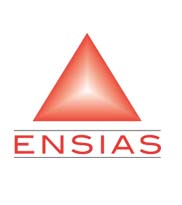- Accueil
-
L'Ecole
-
FORMATIONS
-
FORMATION INGENIEUR
-
Nouvelles filières offertes
- Ingénierie Intelligence Artificielle (2IA)
- Smart Supply Chain & Logistics (2SCL)
- Business Intelligence & Analytics (BI&A)
- Cybersécurité, Cloud et Informatique Mobile (CSCC)
- Data and Software Sciences (D2S)
- Génie de la Data (GD)
- Génie Logiciel (GL)
- Ingénierie Digitale pour la Finance (IDF)
- Smart System Engineering (SSE)
- REGLEMENT DES ETUDES DE L’ENSIAS CYCLE INGENIEUR
-
Nouvelles filières offertes
-
FORMATION INGENIEUR
- FORMATION CONTINUE
-
Recherche
- INTERNATIONAL
- ENTREPRISES
- VIE ESTUDIANTINE
- BIBLIOTHEQUE
LES DERNIÈRES INFORMATIONS
Gradient-descent decoding of one-step majority-logic decodable codes
| Titre | Gradient-descent decoding of one-step majority-logic decodable codes |
| Publication Type | Journal Article |
| Year of Publication | 2020 |
| Authors | Yatribi, A, Belkasmi, M, Ayoub, F |
| Journal | Physical Communication |
| Volume | 39 |
| Pagination | 100999 |
| ISSN | 1874-4907 |
| Mots-clés | AWGN channels, Decoding complexity, Difference-set codes, Finite geometry LDPC codes, Gradient-descent decoding, Iterative majority-logic decoding, Maximum likelihood decoding, OSMLD codes |
| Abstract | In this paper, a new low-complexity gradient-descent based iterative majority-logic decoder (GD-MLGD) is proposed for decoding One-Step Majority-Logic Decodable (OSMLD) codes. We give a formulation of the decoding problem of binary OSMLD codes, as a maximization problem of a derivable objective function. The optimization problem is solved using a pseudo gradient-descent algorithm, which performs iteratively an update towards the optimal estimated codeword been transmitted, based on the first-order partial derivatives of each variable calculated in the previous iteration. The proposed decoding scheme achieves a fast convergence to an optimum codeword compared to other decoding techniques reviewed in this paper, at the cost of lower computational complexity. The quantized version (QGD-MLGD) is also proposed in order to further reduce the computational complexity. Simulation results show that the proposed decoding algorithms outperform all the existing majority-logic decoding schemes, and also various gradient-descent based bit-flipping algorithms, and performs nearly close to the belief propagation sum–product (BP-SP) decoding algorithm of LDPC codes, especially for high code lengths, providing an efficient trade-off between performance and decoding complexity. Moreover, the proposed quantized algorithm has shown to perform better than all the existing decoding techniques. The proposed decoding algorithms have shown to be suitable for ultra reliable, low latency and energy-constrained communication systems where both high performances and low-complexity are required. |
| URL | https://www.sciencedirect.com/science/article/pii/S1874490719306184 |
| DOI | 10.1016/j.phycom.2019.100999 |
Revues:
LIENS UTILES
Localisation
Contactez-nous
ENSIAS
 Avenue Mohammed Ben Abdallah Regragui, Madinat Al Irfane, BP 713, Agdal Rabat, Maroc
Avenue Mohammed Ben Abdallah Regragui, Madinat Al Irfane, BP 713, Agdal Rabat, Maroc
![]() Télécopie : (+212) 5 37 68 60 78
Télécopie : (+212) 5 37 68 60 78
![]() Secrétariat de direction : 06 61 48 10 97
Secrétariat de direction : 06 61 48 10 97
Secrétariat général : 06 61 34 09 27
Service des affaires financières : 06 61 44 76 79
Service des affaires estudiantines : 06 62 77 10 17 / n.mhirich@um5s.net.ma
CEDOC ST2I : 06 66 39 75 16
Résidences : 06 61 82 89 77
- Compteur de visiteurs:640,540
Education - This is a contributing Drupal Theme
Design by WeebPal.
Design by WeebPal.



































